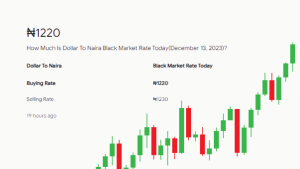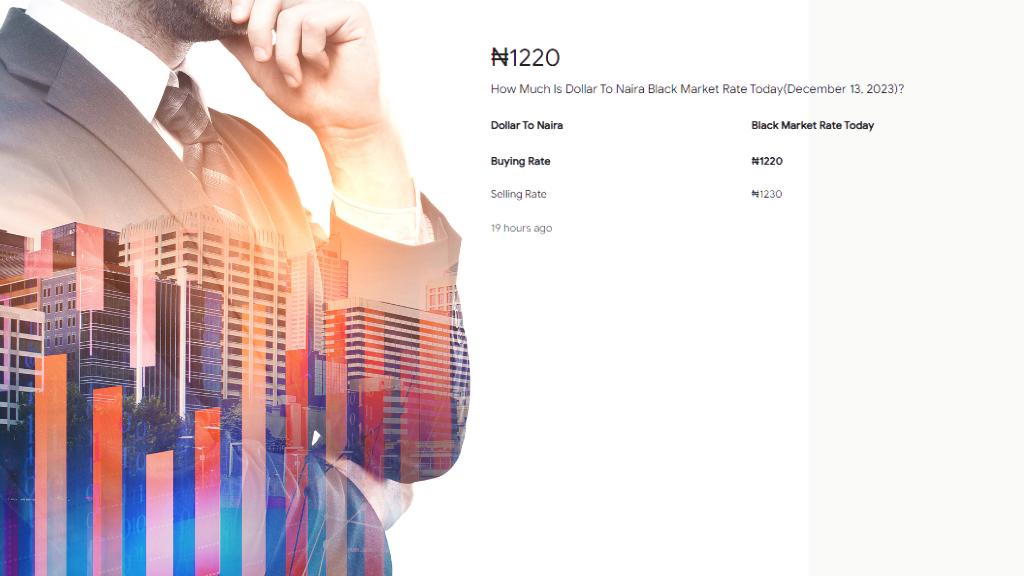The exchange rate between the US dollar and the Nigerian naira has been a topic of concern for many Nigerians, especially those who rely on foreign currency for business or personal transactions. While the official exchange rate is set by the Central Bank of Nigeria, there is also a black market exchange rate that is determined by supply and demand in the informal market. In this article, we will discuss the current exchange rate of the dollar to naira in the black market and how it affects the Nigerian economy.
Understanding the Black Market Exchange Rate
The history of the dollar-to-naira black market
The black market exchange rate is the unofficial rate at which currencies are traded in the informal market. In Nigeria, this market is also known as the parallel market or the “black market.” This rate is determined by the forces of supply and demand rather than being set by the government or central bank. The black market exchange rate is often higher than the official rate, as it reflects the scarcity of foreign currency in the country.
READ THIS- Youth Empowerment Programs in Nigeria 2024: A Comprehensive Guide
The benefits of the black market
Current Exchange Rate of Dollar to Naira in the Black Market
As of August 2023, the black market exchange rate of the naira to the dollar is around 1 USD to 920 NGN. This is significantly higher than the official exchange rate of 1 USD to 650 NGN set by the Central Bank of Nigeria. This large difference in exchange rates has led to a thriving black market for foreign currency in Nigeria, with many individuals and businesses turning to this market for their foreign currency needs.

Impact on the Nigerian Economy
The high black market exchange rate of the naira to the dollar has a significant impact on the Nigerian economy. One of the major effects is the increase in the cost of imported goods. As the naira continues to depreciate against the dollar, the cost of importing goods from other countries becomes more expensive. This, in turn, leads to an increase in the prices of these goods in the local market, making it difficult for Nigerians to afford basic necessities.
Factors Affecting the Black Market Exchange Rate
There are several factors that contribute to the high black market exchange rate of the naira to the dollar. such as economic stability, government policies, inflation rates, political stability, foreign exchange reserves, trade balances, interest rates, government debt levels, market speculation, corruption and informality, global economic conditions, supply and demand dynamics, and political events. Economic instability, high inflation, or economic crises can lead to deviations in black market rates.
Government policies, such as restrictive capital controls and currency restrictions, can also lead to discrepancies between official and black market rates. Inflation rates can erode a currency’s value, potentially affecting the black market rate. Political instability, uncertainty, or a lack of confidence in the government can also contribute to fluctuations in black market exchange rates. Depleted foreign exchange reserves can lead to depreciation and affect black market rates. Trade balances, interest rates, and government debt levels can also influence currency values.
How the black market affects the Nigerian economy
The black market in Nigeria has significant economic impacts, including economic distortions, reduced government revenue, currency devaluation, inflationary pressures, undermining monetary policies, limited foreign direct investment, parallel economies, unemployment challenges, reduced confidence in financial institutions, and complications in implementing exchange rate policies. These activities can also lead to a weakened rule of law, increased corruption, and challenges in economic planning.
Illicit trade and smuggling can contribute to trade imbalances and impact overall economic health. Social inequality may widen economic disparities, and security concerns arise from illicit trade and activities in the black market. Consumer confidence may also be eroded.
Government Efforts to Stabilize the Exchange Rate
The Nigerian government has taken a number of steps to stabilize the naira’s value in relation to the US dollar. Among these is the opening of the Investors and Exporters (I&E) window, which enables exporters and investors to freely exchange foreign currencies. In an attempt to preserve foreign reserves and lower demand for dollars, the government has also limited access to foreign currency for certain products and services.
READ THIS –2024 Ultimate Guide: Top 7 Places to Buy Affordable Land in Lagos, Nigeria
The top 20 dangers of the black market
Conclusion
The black market exchange rate of the naira to the dollar is a major concern for the Nigerian economy. While the government is taking steps to stabilize the exchange rate, it is important for individuals and businesses to be aware of the current rates and plan accordingly. As the country continues to navigate through economic challenges, it is crucial for all stakeholders to work together towards a more stable exchange rate for the benefit of the Nigerian economy.



